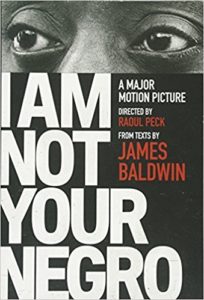 I Am Not Your Negro by James Baldwin, Raoul Peck
I Am Not Your Negro by James Baldwin, Raoul Peck Published by Vintage on February 7th 2017
Genres: Nonfiction
Pages: 144
Format: Paperback
Buy on Amazon
Goodreads

To compose his stunning documentary film I Am Not Your Negro, acclaimed filmmaker Raoul Peck mined James Baldwin's published and unpublished oeuvre, selecting passages from his books, essays, letters, notes, and interviews that are every bit as incisive and pertinent now as they have ever been. Weaving these texts together, Peck brilliantly imagines the book that Baldwin never wrote. In his final years, Baldwin had envisioned a book about his three assassinated friends, Medgar Evers, Malcolm X, and Martin Luther King. His deeply personal notes for the project have never been published before. Peck's film uses them to jump through time, juxtaposing Baldwin's private words with his public statements, in a blazing examination of the tragic history of race in America.
We need James Baldwin right now. It’s strange to read words he wrote in the 1960’s and 1970’s and find so much around you that you recognize. He is maddening, frustratingly incisive about America.
To look around the United States today
is enough to make prophets and angels weep.
This is not the land of the free;
it is only very unwillingly and sporadically
the home of the brave. (97)
Reading this book and watching Raoul Peck’s accompanying film brings to mind this poem by Claude McKay:
Although she feeds me bread of bitterness,
And sinks into my throat her tiger’s tooth,
Stealing my breath of life, I will confess
I love this cultured hell that tests my youth.
Her vigor flows like tides into my blood,
Giving me strength erect against her hate,
Her bigness sweeps my being like a flood.
Yet, as a rebel fronts a king in state,
I stand within her walls with not a shred
Of terror, malice, not a word of jeer.
Darkly I gaze into the days ahead,
And see her might and granite wonders there,
Beneath the touch of Time’s unerring hand,
Like priceless treasures sinking in the sand.
Baldwin’s relationship with America is equally complex. He left for France to escape. As he explains in an excerpt from Dick Cavett Show in answer to philosopher Paul Weiss, brought on the show to rebut Baldwin:
You talk about making it as a writer by yourself, you have to be able then to turn off all the antennae with which you live, because once you turn your back on this society you may die. You may die. And it’s very hard to sit at a typewriter and concentrate on that if you are afraid of the world around you. The years I lived in Paris did one thing for me: they released me from that particular social terror, which was not the paranoia of my own mind, but a real social danger in the face of every cop, every boss, everybody. (88)
But Baldwin returned to America. As Baldwin says,
But I had missed my brothers and sisters
and my mother.
They made a difference.
I wanted to be able to see them,
and to see their children.
I hoped that they wouldn’t forget me.I missed Harlem Sunday mornings
and fried chicken and biscuits,
I missed the music,
I missed the style—
that style possessed by no other people in the world.
I missed the way the dark face closes,
the way dark eyes watch,
and the way, when a dark face opens, a light seems to go everywhere.
I missed, in short, my connections,
missed the life which had produced me
and nourished me and paid for me.
Now, though I was a stranger,
I was home. (13-14)
Of course, he returned to France and lived there until his death. Baldwin was clearly frustrated by America’s inability to change. I wonder what he would make out of America today. I guess I don’t need to wonder. I know. What he said to Dick Cavett in 1968 still holds true:
I can’t say it’s a Christian nation, that your brothers will never do that [kill you] to you, because the record is too long and too bloody. That’s all we have done. All your buried corpses now begin to speak… [W]hen… any white man in the world says, “give me liberty, or give me death,” the entire white world applauds. When a black man says exactly the same thing, word for word, he is judged a criminal and treated like one and everything possible is done to make an example of this bad nigger, so there won’t be any more like him. (81-82)
That was 50 years ago.
As Baldwin so aptly and succinctly concludes, “The story of the Negro in America / is the story of America. / It is not a pretty story” (95). So what do we do? Even Baldwin is not without hope. As he says near the end of the book, “Not everything that is faced can be changed; / but nothing can be changed until it is faced” (103). We do need to face who we are and who we have been. Baldwin makes this request:
What white people have to do is try and find out in their own hearts why it was necessary to have a “nigger” in the first place, because I’m not a nigger, I’m a man. But if you think I’m a nigger, it means you need him… If I’m not the nigger here and you invented him, you the white people invented him, then you’ve got to find out why. And the future of the country depends on that, whether or not it is able to ask that question. (109)
This book should definitely be paired with Raoul Peck’s film. The book is a loose collection of notes and snippets of transcriptions. What it offers that the film doesn’t is a chance to slow down and savor Baldwin’s language. He was truly a gifted writer and thinker. However, it is when the word is paired with image and film (as well as music) that Baldwin’s words truly come alive. Samuel L. Jackson narrates Baldwin beautifully (I admit I wasn’t sure about how that was going to be until I listened). I viewed the film through my Amazon Prime subscription as it is unavailable on Netflix, but here is a trailer:

